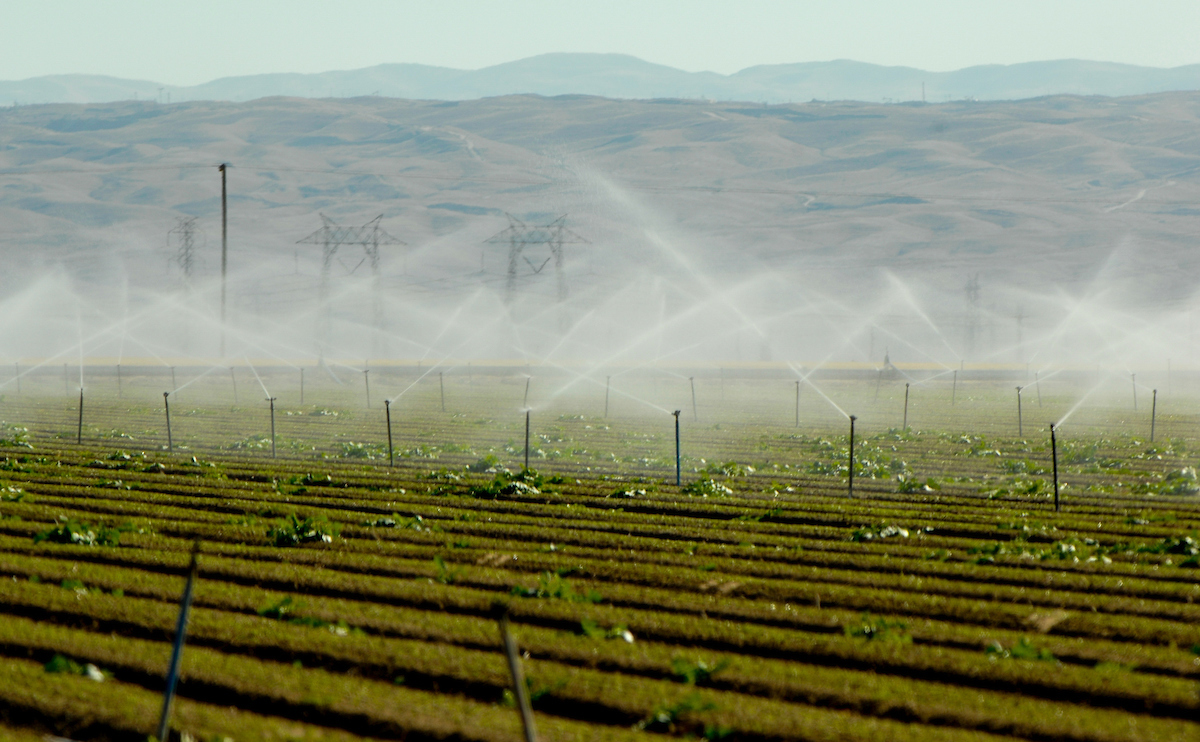An irrigation system waters an agricultural field in California. 
*Note: News release updated on September 9, 2020 to reflect revised public comment contact information
SACRAMENTO, Calif. – Updated draft guidance for local water managers in developing state-mandated water management plans have been released for public comment. New elements for the urban and agricultural water management plans reflect lessons learned from the 2014 - 2017 drought, advances in water measurement technology, and a continued commitment to the long-term sustainability of the Delta.
Urban and Agricultural water management plans serve as long-term water supply and demand management strategies. Both water management plans assess current water demands and supplies; however, Urban water management plans estimate future needs and opportunities while Agricultural water management plans assess water management objectives. The new draft guidance responds to recent legislation updating the required components of each plan.
“Proactively preparing for the effects of climate change, extreme weather and extended dry periods is critical to ensuring long-term, regional sustainability,” said Kris Tjernell, Deputy Director for Integrated Watershed Management at the California Department of Water Resources. “Assisted by DWR’s updated guidebooks, local agencies will be better positioned to invest in diverse and innovative water management strategies, actions also called for in Governor Newsom’s Water Resilience Portfolio.”
For the first time, agricultural water management plans will include a water budget to account for all water supplies and uses, a quantification of water use efficiency as well as actions to prepare for and manage through periods of inevitable drought. Urban water management plans will assess an agency’s ability to manage through at least five years of drought. Urban suppliers will also assess their systems’ vulnerability to earthquakes and climate change and must ensure that their planning efforts align with local Groundwater Sustainability Agency plans.
These planning efforts will encourage local agencies to develop and invest in regional supply strategies such as water efficiency, water recycling, and improved groundwater management. Urban and agricultural water suppliers are required to develop and submit water management plans to DWR every five years. The draft guidebooks include background information and tables that suppliers can incorporate into their plans.
The Delta Plan requires agricultural and urban water suppliers that anticipate participating in or receiving water from a proposed Delta project to demonstrate in their plans a reduced reliance on water from the Delta. DWR developed draft guidebook appendices to explain the requirement and provide example technical approaches for quantifying reduced reliance on the Delta. The examples were developed in close coordination with stakeholders including the Delta Stewardship Council (DSC) and water agencies. This is one factor the DSC may take into consideration when making a consistency determination on project applications.
On September 16, 2020, DWR will host virtual public workshops to collect input and public comment on the draft guidebooks. The public comment period will close at 5 p.m. Monday, September 28, 2020.
For more information about attending the public workshops and submitting a comment for the draft guidebooks, contact the following:
Urban Water Management Plan 2020 Guidebook Draft
- Julia Ekstrom at uwmphelp@water.ca.gov
Agricultural Water Management Plan Guidebook 2020 Draft
- Sabrina Cook at agwue@water.ca.gov
###
Contact:
Erin Mellon, Deputy Director of Communications, Department of Water Resources
(916) 704-5529 | erin.mellon@water.ca.gov
